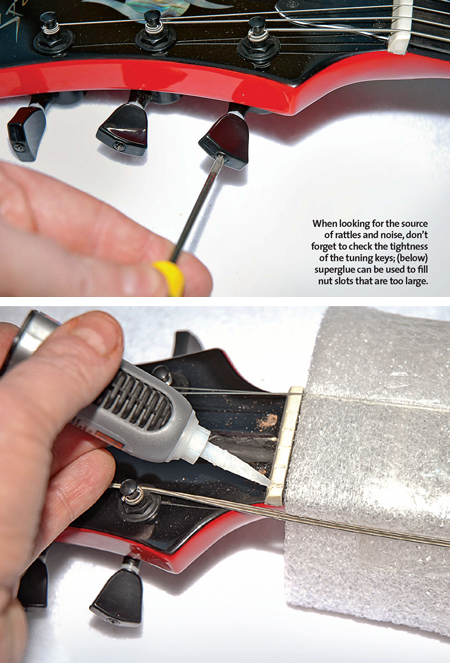How To Find And Fix Rattles From Your Guitar's Hardware
Get rid of annoying noise with our easy guide to fixing your guitar

Five steps to make your guitar noise free.
My guitar has recently developed an annoying buzz or rattle, and I can’t figure out where it’s coming from. It’s a Mexican-made Fender Telecaster that’s only a few years old, so it can’t be attributed to old age. How would you solve this problem?
Annoying rattles and buzzing sounds are part of a guitarist’s life. The source of these unwelcome noises can be difficult to find, so you have to be methodical in your approach. Vibrations created when you play your guitar can loosen the pickups, truss rod, saddles, machine heads and so on. Here’s how to determine what’s causing all the buzz.

1. Work from the headstock down. A buzz from the headstock can sound like it’s coming from the guitar’s body. Begin by checking to see if any of the machine heads are loose. If the machine head buttons are loose gently tighten them with a screwdriver. Use the correct size screwdriver to avoid damaging the screws. The buttons should be firm enough to not rattle but not too tight to turn. If your machine heads have bolts securing them to the headstock, make sure they are holding tight. Use a pair of pliers or the correct sized wrench to tighten them. Be careful that you don’t damage the bolts or your guitar’s finish.
2. Move down to the truss-rod cover. Remove the cover and, using an Allen key—or whatever the correct adjusting tool is for your truss rod—check to see if the rod is loose, which could be causing the rattling noise. You can also test the truss rod by slapping the back of the guitar’s neck. If the truss rod is loose you’ll hear it rattle in its slot. Tighten it clockwise until it catches and becomes secure. Whenever you replace the truss-rod cover on your guitar—if it has one, of course—always make sure that it is screwed down securely. If not, it’ll rattle. The truss-rod cover screws may be made of soft metal, so take care not to damage them.
3. Look at the top nut. If your guitar has a conventional bone, graphite or plastic nut, check that the slots are the correct size for the strings. If they’re too big, they could cause the strings to buzz. If the slots are too big you have two choices: replace the nut or fill in the slots and re-cut them. To fill them in, carefully introduce superglue into the slot. Once dry, add another layer. Repeat the process until the slot is packed. With the glue dry, use the correct size file to recut the slot. Pay attention to the depth of the slot and make it even, otherwise it will just buzz again.
4. If your guitar has a bolt-on neck make sure that the bolts are good and tight. Also check your strap buttons. If that all seems okay, take a look at the pickups. Are they secure? Tighten the adjusting screws if necessary.
Get The Pick Newsletter
All the latest guitar news, interviews, lessons, reviews, deals and more, direct to your inbox!
5. Examine the guitar’s bridge carefully. Are there any worn parts? Pay special attention to the saddles. If they are heavily worn, with deep grooves cut by the strings, it’s probably best to replace them. The little height-adjustment screws on the saddles can become loose. To keep them in place, apply a small dab of clear nail varnish—not superglue! The varnish will stop the screws moving but will conveniently snap off if you ever need to adjust them.
Ed Mitchell was Reviews Editor on Total Guitar magazine from 2003, and his guitar-modding column, Ed’s Shed, appeared in print on both sides of the Atlantic (in both Total Guitar and Guitar World magazines). He was the Editor of The Blues Magazine from 2012-16, and a contributor to Guitarist, Classic Rock and Louder. He died in October 2022, aged 52. Between them, the websites Guitar World, Louder and MusicRadar host over 400 of his articles – among them interviews with Billy Gibbons, Paul Weller, Brian Setzer, profiles on Roy Buchanan, Duane Allman and Peter Green, a joint interview with Jimmy Page and Jack White, and dozens of guitar reviews – and that’s just the ones that made it online.
"Upgrading from your entry-level acoustic opens the door to an entirely new world of tonewoods, body shapes, and brands": 6 signs it's time to upgrade from your first acoustic guitar
"I'm past my prime": 5 common excuses for not learning the guitar – and 5 body and mind-boosting reasons you should



![[from left] George Harrison with his Gretsch Country Gentleman, Norman Harris of Norman's Rare Guitars holds a gold-top Les Paul, John Fogerty with his legendary 1969 Rickenbacker](https://cdn.mos.cms.futurecdn.net/TuH3nuhn9etqjdn5sy4ntW.jpg)







